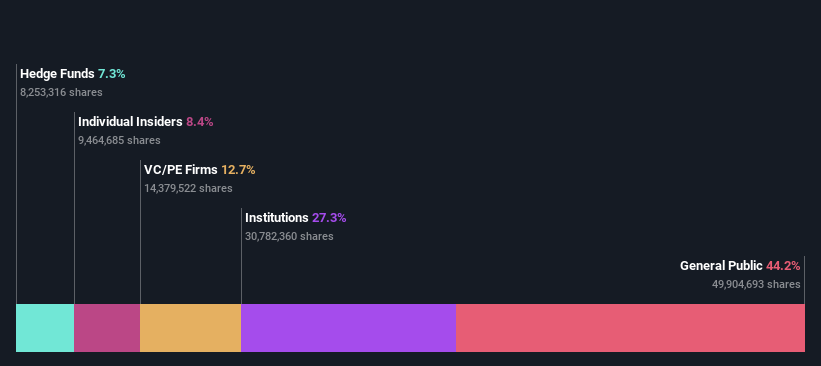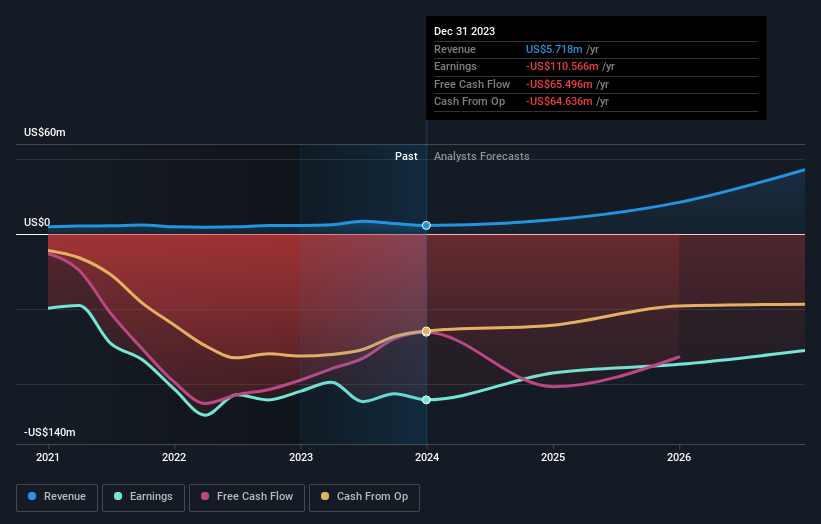- United States
- /
- Biotech
- /
- NasdaqGS:ABSI
Both retail investors who control a good portion of Absci Corporation (NASDAQ:ABSI) along with institutions must be dismayed after last week's 16% decrease

Key Insights
- The considerable ownership by retail investors in Absci indicates that they collectively have a greater say in management and business strategy
- The top 14 shareholders own 50% of the company
- Institutions own 27% of Absci
If you want to know who really controls Absci Corporation (NASDAQ:ABSI), then you'll have to look at the makeup of its share registry. With 44% stake, retail investors possess the maximum shares in the company. Put another way, the group faces the maximum upside potential (or downside risk).
While institutions, who own 27% shares weren’t spared from last week’s US$98m market cap drop, retail investors as a group suffered the maximum losses
Let's take a closer look to see what the different types of shareholders can tell us about Absci.
Check out our latest analysis for Absci

What Does The Institutional Ownership Tell Us About Absci?
Institutions typically measure themselves against a benchmark when reporting to their own investors, so they often become more enthusiastic about a stock once it's included in a major index. We would expect most companies to have some institutions on the register, especially if they are growing.
As you can see, institutional investors have a fair amount of stake in Absci. This can indicate that the company has a certain degree of credibility in the investment community. However, it is best to be wary of relying on the supposed validation that comes with institutional investors. They too, get it wrong sometimes. If multiple institutions change their view on a stock at the same time, you could see the share price drop fast. It's therefore worth looking at Absci's earnings history below. Of course, the future is what really matters.

Our data indicates that hedge funds own 7.3% of Absci. That's interesting, because hedge funds can be quite active and activist. Many look for medium term catalysts that will drive the share price higher. Phoenix Venture Partners LLC is currently the company's largest shareholder with 13% of shares outstanding. With 12% and 7.7% of the shares outstanding respectively, FMR LLC and Sean McClain are the second and third largest shareholders. Sean McClain, who is the third-largest shareholder, also happens to hold the title of Member of the Board of Directors.
A closer look at our ownership figures suggests that the top 14 shareholders have a combined ownership of 50% implying that no single shareholder has a majority.
While studying institutional ownership for a company can add value to your research, it is also a good practice to research analyst recommendations to get a deeper understand of a stock's expected performance. There are a reasonable number of analysts covering the stock, so it might be useful to find out their aggregate view on the future.
Insider Ownership Of Absci
The definition of an insider can differ slightly between different countries, but members of the board of directors always count. Company management run the business, but the CEO will answer to the board, even if he or she is a member of it.
Insider ownership is positive when it signals leadership are thinking like the true owners of the company. However, high insider ownership can also give immense power to a small group within the company. This can be negative in some circumstances.
We can report that insiders do own shares in Absci Corporation. As individuals, the insiders collectively own US$43m worth of the US$509m company. Some would say this shows alignment of interests between shareholders and the board. But it might be worth checking if those insiders have been selling.
General Public Ownership
The general public, who are usually individual investors, hold a 44% stake in Absci. This size of ownership, while considerable, may not be enough to change company policy if the decision is not in sync with other large shareholders.
Private Equity Ownership
With a stake of 13%, private equity firms could influence the Absci board. Some investors might be encouraged by this, since private equity are sometimes able to encourage strategies that help the market see the value in the company. Alternatively, those holders might be exiting the investment after taking it public.
Next Steps:
It's always worth thinking about the different groups who own shares in a company. But to understand Absci better, we need to consider many other factors. To that end, you should be aware of the 3 warning signs we've spotted with Absci .
If you are like me, you may want to think about whether this company will grow or shrink. Luckily, you can check this free report showing analyst forecasts for its future.
NB: Figures in this article are calculated using data from the last twelve months, which refer to the 12-month period ending on the last date of the month the financial statement is dated. This may not be consistent with full year annual report figures.
New: Manage All Your Stock Portfolios in One Place
We've created the ultimate portfolio companion for stock investors, and it's free.
• Connect an unlimited number of Portfolios and see your total in one currency
• Be alerted to new Warning Signs or Risks via email or mobile
• Track the Fair Value of your stocks
Have feedback on this article? Concerned about the content? Get in touch with us directly. Alternatively, email editorial-team (at) simplywallst.com.
This article by Simply Wall St is general in nature. We provide commentary based on historical data and analyst forecasts only using an unbiased methodology and our articles are not intended to be financial advice. It does not constitute a recommendation to buy or sell any stock, and does not take account of your objectives, or your financial situation. We aim to bring you long-term focused analysis driven by fundamental data. Note that our analysis may not factor in the latest price-sensitive company announcements or qualitative material. Simply Wall St has no position in any stocks mentioned.
About NasdaqGS:ABSI
Absci
Operates as a data-first generative artificial intelligence (AI) drug creation company in the United States.
Excellent balance sheet slight.


